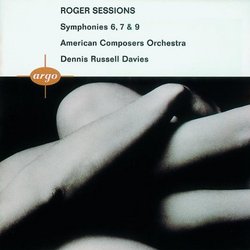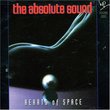| All Artists: Sessions, Davies, Amercan Composers Orchestra Title: Roger Sessions: Symphonies 6, 7 & 9 Members Wishing: 1 Total Copies: 0 Label: Polygram Records Release Date: 1/23/1996 Genre: Classical Style: Symphonies Number of Discs: 1 SwapaCD Credits: 1 UPC: 028944451924 |
Search - Sessions, Davies, Amercan Composers Orchestra :: Roger Sessions: Symphonies 6, 7 & 9
 | Sessions, Davies, Amercan Composers Orchestra Roger Sessions: Symphonies 6, 7 & 9 Genre: Classical
Sessions (1896-1985) is an American composer with a voice all his own. He eschewed fads and trends and pretty much stuck to his own guns. Symphonies 6 and 7 (1966 and 1967) were composed during the Vietnam War and both r... more » |
Larger Image |
CD DetailsSynopsis
Amazon.com Sessions (1896-1985) is an American composer with a voice all his own. He eschewed fads and trends and pretty much stuck to his own guns. Symphonies 6 and 7 (1966 and 1967) were composed during the Vietnam War and both reflect the turbulence of those years. The music partakes of aspects of serialism and atonality, but his music has its own internal logic. Symphony 9 (1978) has much of the same atonality, but there is much more breathing room--room for ideas to develop and for clusters to be set apart from themselves. This is very mature symphonic writing with a bang-up job on behalf of Dennis Davies and the American Composers Orchestra. --Paul Cook Similar CDs
|
CD ReviewsMore Schoenberg symphonies by Roger Sessions Discophage | France | 11/28/2007 (5 out of 5 stars) "In my reviews of his Symphonies #3 through 5, Rhapsody and late Concerto for orchestra (see Roger Sessions: Symphonies Nos. 1, 2, 3, Roger Sessions: Symphony No. 4; Symphony No. 5; Rhapsody and Symphony 8 / Concerto for Orchestra), I commented that Sessions had composed the symphonies Schoenberg never wrote, and that statement can be equally applied to Symphonies 6, 7 and 9 featured here. They were written respectively in 1966, 1967 and 1968. The author of the liner notes, Andrea Omstead, a close friend and recognized specialist of Sessions, comments that 6 and 7 partake of a fifth compositional period of the composer, while 9 is representative of a sixth manner. Maybe so, but withouth scores and playing by ear, Sessions' style sounds fairly consistent throughout, and quite similar to the above-mentioned symphonies. And don't take my Schoenberg similitude as disparaging. On the contrary: Sessions may sound imitative, but I find him not inferior to his model - and after all, Schoenberg did NOT write these symphonies, so I am grateful to Sessions for doing it in Schoenberg's stead. So, for those who don't know the orchestral music of Sessions, if they, like me, appreciate the music of Schoenberg (especially his Variations Op. 31), if they recognize and enjoy its stern but intense atonal lyricism, the richness of its orchestral colors, the denseness of its contrapuntal activity, its drama, and even its relative rhythmic squareness, the chances are that they will like these very characteristics in the orchestral music of Sessions - and the other way around.
For newcomers to Sessions this disc is as good an introduction to the composer as they will find, and for the composer's admirers it is, needless to say, an indispensable acquisition. And by the way: those who do like the orchestral music of Schoenberg and Sessions should by all means try Wallingford Riegger (see for instance Wallingford Riegger: Variations / Sym No.4 or Riegger: Symphony No3, Romanza, Dance Rhythms, Music for Orchestra, Concerto for Piano and Woodwind Quintet, Music for Brass Choir, Movement for Two Trumpets Trombone and Piano, Nonet for Brass), the introducer of the twelve-tone system in America and one of the lesser-known members of the group known as "The American Five", which included Ives, Ruggles, Cowell and the even lesser-know John J. Becker - also a composer whose discovery is long overdue, judging from his Third Symphony Sinfonia Brevis (The Louisville Orchestra-First Edition Encores) and other works featured on John J. Becker: Soundpieces 1 & 5 / At Dieppe / Concerto Arabesque. " |

 Track Listings (9) - Disc #1
Track Listings (9) - Disc #1
